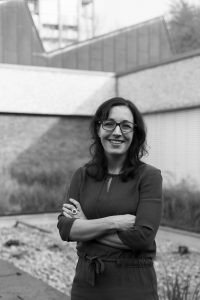Gülsah Stapel

Recht auf Erbe in der Migrationsgesellschaft. Eine Studie an städtischen Erinnerungsorten türkeistämmiger Berlinerinnen und Berliner.
With its buildings, streets, squares and objects, public space represents a heritage of the city common to the inhabitants, which can be appropriated and used in different, parallel and plural ways. Socio-politically organised structures give this simultaneity and plurality an organisational, but also content-related framework. In particular, the agencies of public remembrance, such as museums, heritage preservations, archives, schoolbooks, memorials and municipal representatives* bear an effective responsibility for dealing with the city’s common heritage on behalf of society and in the interest of the general public.
They influence narratives, facilitate the different actors if necessary, decide which symbols may be placed in public space, which should be preserved and how the knowledge about them is to be preserved, communicated and made accessible. These bodies are accused of having a social mandate, but not fulfilling their tasks in the sense of a just conception of the general public. The criticisms relate in particular to the inadequate representation of social diversity and the insufficient attention paid to the responsibility to reduce discriminatory and racist attributions of identity. In this paper, I refer to the discourse on these criticisms as the Right to Heritage in a Migration Society. In this explorative study I try to think along with the criticized aspects of heritage making and to elaborate the possibilities and challenges of a more inclusive heritage practice on the basis of a specific approach of previously disadvantaged actors. As a result, in this work one is always thrown out of the spiral between identity and heritage by using a Brechtian manner between the acquired heritage knowledge and the various heritage constructions behind it. The proposed arguments for a more just Right to Heritage in a Migration Society are based on discourse theory, history and ethnography, but are at the same time inevitably political. It is a plea for new frame narratives through object-oriented historical research and not through research or heritage making for specific groups.